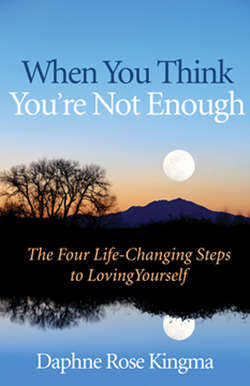Читать книгу When You Think You're Not Enough - Daphne Rose Kingma - Страница 8
На сайте Литреса книга снята с продажи.
Introduction
ОглавлениеUnfortunately, in the years since I first offered this book, the issue of self-love has not become irrelevant. That's sad, of course, but in another way weirdly encouraging: the difficult feelings we all have from time to time about not being enough are, in fact, an invitation to each of us to develop a higher quality of self-regard.
Loving yourself is not an incidental undertaking. It's the most important job that each of us has come here to do. It's the one thing we really need to accomplish on behalf of the one and only person for whom we're totally responsible. It's also the key to opening the door to greater love, warmth, and intimacy in all our other relationships. Indeed, it's only when you reside in the nourishing feeling of loving yourself that you have a clear sense of what you seek in your relationships with others, as well as what you can offer them in return. When you know how good it feels to trust, honor, and enjoy yourself, you know that these same feelings, invested in someone else, can lift other people's spirits and give them a sense of their own value. In this way self-love becomes the standard not only for what we want to receive, but also for how to become a more loving person and have deeper, richer, and more meaningful relationships.
Self-love also serves another important function in our lives: it allows us to understand exactly what we have to offer to the world. As we come to recognize our specific gifts and talents, we also discover the specific purpose that we are here to accomplish.
The opposite of such life-enhancing self-regard is the haunting belief that you are somehow not enough. It generally shows up in the form of that creepy little dust-covered voice in the basement of your consciousness that keeps climbing up the stairs and telling you that you're not beautiful enough, tall enough, smart enough, educated enough, or intelligent enough to get chosen, to be loved, to succeed. You aren't a good enough parent, a sexy enough lover, a supportive enough spouse, a strong enough provider, a decisive enough leader, a submissive enough employee to get the outcome you desire. Even a chronic over-giving do-gooder type can worry about not doing enough: giving enough money, saying the right thing, bringing the right gift, choosing the best card. No matter what its specific message, one way or another the nasty little voice keeps wreaking havoc with your ongoing attempts to feel good about yourself.
Sometimes the voice makes a billboard pronouncement: “Of course he wasn't going to pick you, you idiot; you're not pretty enough.” Or “How could you possibly make the right choice; you can't even decide what to order for dinner?” At other times, it seems to have taken up fulltime residence on the couch of your consciousness and just plain laughs in your face when you try to make a concerted effort at loving yourself: “What's the point?” it says, “Good things never happen to you.”
Why are we so darn hard on ourselves? Why are we always measuring ourselves against some invisible, perfect, utterly outrageous standard? Why can't we lay off? And if we could stop for even a minute—one friend told me she realized she hadn't beat herself up for four whole hours yesterday!—how can we replace the feeling of not-good-enoughness with the kind of positive, self-honoring self-celebration that could change not only us, but ultimately, everyone around us?
The good news is that you're not stuck with how you feel about yourself right now. There is a way to permanently change your self-concept, and this book offers a template for doing just that. We'll start by looking at the not entirely surprising origins of your self-deprecating opinions. Then you'll learn the four simple but profoundly life-changing steps to recognizing the beautiful truth of who you really are. Instead of continuing to rip yourself up with self-doubt, self-judgment, and second-guessing, you'll discover how to treat yourself with more acceptance, compassion, appreciation, and respect. Finally, you'll learn how to take this newly crafted sense of yourself and apply it to fulfilling the purpose that is uniquely yours in the world. Once you've done that, you'll find that the dance card of your life is so well filled that there just isn't any room for thinking that you're not enough.
If you'd like to come to peace with yourself, you might begin by answering these two simple questions: Who better to love you than you? What better undertaking could there be than to learn how to sweetly, happily, joyfully, generously, calmly, intelligently, compassionately, and respectfully love yourself?
Come. Take my hand. Let's take the first step.
